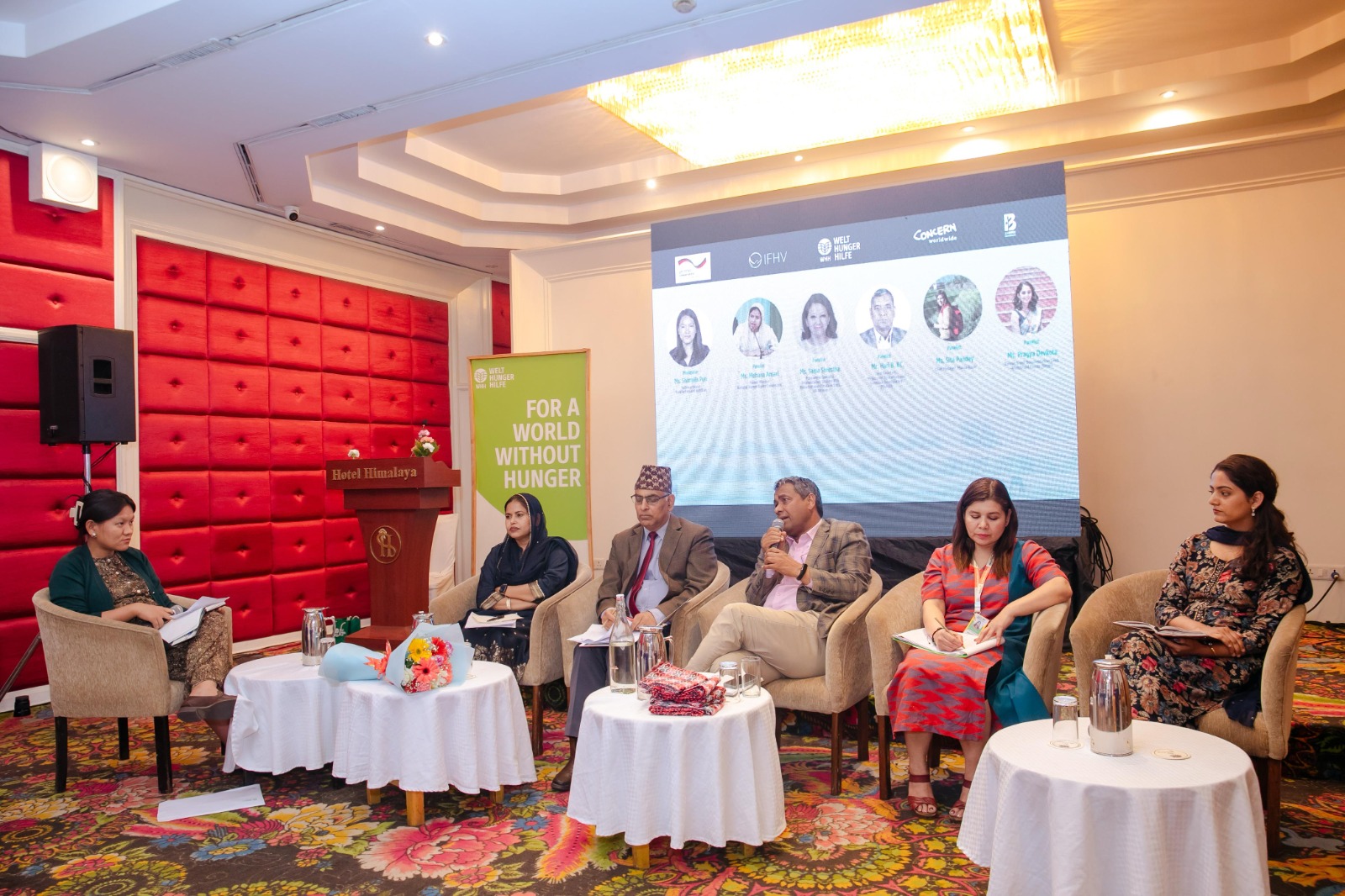Kathmandu. Nepal launched the 19th edition of the Global Hunger Index (GHI) 2024, placing gender justice at the heart of its strategy to combat hunger and build climate resilience.
Co-hosted by Welthungerhilfe (WHH) Nepal and LI-BIRD (Local Initiatives for Biodiversity, Research, and Development), the national event brought together a diverse spectrum of stakeholders, including government officials, civil society representatives, development partners, and grassroots voices, to reflect on Nepal’s progress and chart the future of food and nutrition security.
Despite global setbacks, Nepal has shown significant strides in combating hunger, with the GHI 2024 highlighting a 22.4-point reduction in its hunger score since 2000, representing a 60.4% improvement. This progress has elevated Nepal to 68th place globally, moving it from the “alarming” to the “moderate” category.
Yet, the country continues to face serious challenges: 24.8% of children under five are still stunted, and undernourishment remains prevalent, particularly among climate-vulnerable and marginalized groups.
The central theme of this year’s index—gender justice as a pillar of Zero Hunger and climate resilience—resonated throughout the event.
Women and girls, who disproportionately bear the brunt of hunger and climate shocks, were identified not only as vulnerable populations but as crucial agents of change in transforming food systems.
Chairing the program, Dr. Pratap Kumar Shrestha, Executive Board Chair of LI-BIRD, underscored the urgency of embedding gender justice in national strategies. Mr. Shakeb Nabi, Country Director of WHH Nepal, emphasized that while Nepal has made progress, it remains highly vulnerable to climate-induced disasters. He stressed that empowering women and girls is essential to achieving resilient food systems.
Minister of Agriculture and Livestock Development (MoALD), Ram Nath Adhikari, highlighted the government’s commitment to agroecology and gender equality, sharing plans to formalize an Agroecology Roadmap as a national strategy.
Supporting this, Dr. Ram Krishna Shrestha, Joint Secretary at MoALD, said the roadmap will help create a sustainable, inclusive food system for smallholder farmers and marginalized groups.
From the field, voices like Ms. Gauri Dahal, a woman farmer from Surkhet, shared experiences from the Green Karnali Project, which promotes organic farming and the use of women-friendly tools.
Local officials such as Mayor Mohan Maya Dhakal of Birendranagar called for coordinated government action to implement climate-resilient agricultural programs, especially in Karnali—the region most exposed to climate risks.
National and international perspectives added further depth. Dr. Doj Raj Khanal, Executive Director of NARC, urged for youth-centric, sustainable agricultural policies. Mr. Benjamin Seidel, Deputy Head of Mission at the German Embassy, advocated for global partnerships and female-led agri-entrepreneurship. Former Foreign Minister Bimala Rai Poudyal and human rights advocate Mohana Ansari both emphasized tackling inequality and empowering women as prerequisites to ending hunger.
The value of indigenous knowledge also featured prominently. Ms. Sita Pandey, Chief Manager of Munaa Bazar, and Ms. Pragya Devkota from the World Food Forum, stressed the need for data-driven policies, concessional financing, and technological access for women and youth in agriculture. WHH’s technical expert Sharmila Pun added that structural inequalities must be dismantled through principles of recognition, redistribution, and representation.
The government’s evolving policy frameworks were also shared by Dr. Hari B. KC, Joint Secretary at MoALD, who spoke of decentralization, promotion of high-value crops, and the integration of gender justice, climate resilience, and nutrition security into the national roadmap.
Dr. Kiran Rupakheti concluded the panel with a call for inter-ministerial collaboration, youth retention in agriculture, and a gender-transformative, systems-based approach as laid out in the Multi-sector Nutrition Plan III (MSNP III). He emphasized the importance of openness, collective learning, and a continued government commitment to inclusive food security.
The launch event concluded with seven key recommendations Embed gender-transformative approaches in food and climate policies, ensure inclusive leadership by women, youth, and marginalized communities, Promote agroecology and indigenous knowledge for sustainability, Expand access to finance, technology, and markets for smallholders, Invest in community-led climate adaptation initiatives, Strengthen multi-stakeholder collaboration at all levels and Uphold the right to food and food sovereignty through legal and policy reforms.
As Nepal moves forward, the GHI 2024 sends a powerful message: achieving Zero Hunger is inseparable from gender equity and climate resilience. With targeted policy, inclusive governance, and community empowerment, Nepal is building a foundation for a sustainable and just food future.


